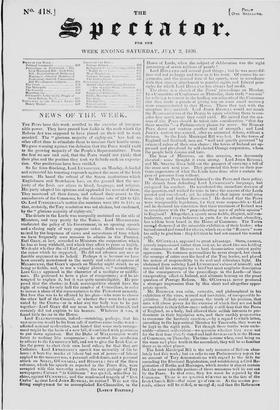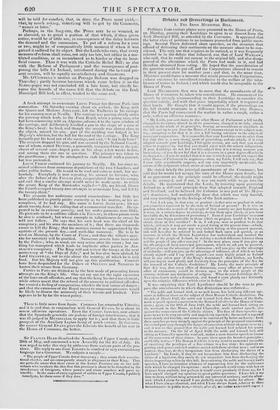NEWS OF TILE W EE K.
THE Peers have this week revelled in the exercise of irrespon- sible power. They have proved how feeble is the curb which the
Reform Act was supposed to have placed on their will to work mischief. The " glorious majority of eighty'-six" has had no other effect than to stimulate them to increase their hostile array.
We gave warning against the delusion that the Peers would yield to the growing majority of the People's Representatives. From the first we saw and said, that the Peers would not yield; that their plan and the position they took up forbade such an expecta- tion. Our predictions have been verified.
So far from flinching, Lord Lvainutritsr, on Monday, defended and reiterated his taunting reproach against the mass of the Irish nation. Ile based the refusal of the Saxon institutions which
Englishmen and Scotehmen love, on the ground that the ma- jority of the Irish are aliens in blood, language, and religion. His party adopted his opinions and applauded his avowal of therm They mustered all their forces, and refused their assent to the amendments of the Commons, by the decisive vote of 220 to 123. On Lord FITZGERALD'S motion the numbers were 203 to 119; so that, certainly, theTory resolution was not shaken, but confirmed, by the" glorious majority of eighty-six."
The debate in the Lords was unequally sustained on the side of Ministers, and very poorly by the Tories. Lord MELBOURNE vindicated the policy of his Government, in an opening speech and a closing reply of very superior order. Both were charac- terized by the largeness of views and earnestness of tone which we have frequently seen occasion to admire in the Premier. Earl GREY, at last, accorded to Ministers the cooperation which he has so long withheld, and which they affect to prize so highly. We doubt whether the oh! Earl gained a single additional vote for the cause which he supported. He did not advance any new or forcible argument in its behalf. Perhaps it is because we have been recently accustomed to the manly and robust eloquence of MELBOURNE, that GREY'S speech on Monday night struck us as being so feeble, and, to use a vulgar phrase, so " maundering." Lord GIZ.LY appeared in the character of a mediator or middle- man. lie professed to have a plan of compromise; and he at- tempted to explain it, but it was quite unintelligible. He pro- posed that the electors in Irish municipalities should have the right of voting for only half the number of Councillors, in order to insure a share of the representation to the Protestant minority.. But how this was to be effected by his plan—who were to choose the other half of the Council, or whether they were to be nomi- nated by the Crown--or in what way the body was to be put together—Lord GREY did not seem to understand himself, and certainly did not explain to his hearers. Whatever it w as, it found little favour in the House.
Lord ELLENBOROUGH, indeed—surmising, perhaps, that his vast sinecure would be far from safe if matters came to the worst— affected unusual moderation, and hinted that some such arrange- ment might be the basis of a new bill, if combined with provisions to put down agitation. But the Duke of WELLINGTON would listen to nothing like compromise : he avowed his resolution to adhere to the Lvannuitsr bill, and not to give the Irish Cati.o- lics the power to elect their own local rulers, for that they are Catholics. Lord LYNDHURST'S speech was unworthy of his ta- lents : it bore the marks of labour but not of power—of labour applied to the meanest use, a personal self-defence, and a personal attack on SHEIL, O'CoNNELL, and RUSSELL: two of the three columns, which his speech as reported in the Times fills, were occupied with this unworthy matter, the very garbage of Tory newspapers; ClcuRo "in Catilinam " was quoted, schoolboy fa- shion, against O'CONNELL, and the condemned tragedy of" Don Carlos" against Lord JOHN RUSSELL, its author! Was not this Ailing employment for an accomplished Ex-Chancellor, in the
[LATEST EDITION,'
house of Lords, when the subject of deliberation was the right governing of seven millions of people?
Lord HoLLAND said several good things ; but he was more dif- fuse and not so happy and terse as is his wont. Of course his .ar- aliments, and the general tone of his speech, were in accordance with that sincere attachment to popular rights and Liberal prin- ciples for vvhich Lord Ho LI, AND has always had credit.
The above is a sketch of the Peers' proceedings on Monday. In a Committee of Conference on Thursday, their tartly " reason's" fur refusing, to concur in the leading amendments of the Commons (for they made a parade of giving way on some small matters) were communicated to that House. There they met with the reception they merited. Lord Jonst Russial. would not insult the Representatives of the People by again soliciting them to con- sider how much more they could yield. Ile moved that the rea- sons of the Peers should be taken into consideration " that day three mouths "—a Parliamentary phrase for never. Sir ROBERT PEEL durst not venture another trial of strength ; and Lord JOHN'S motion was carried, after an animated debate, without a division. So the Irish Municipal Bill was lost. In the towns of England and Scotland, men are " well and quietly governed" by esteemed rulers of their own choice : the towns of Ireland are op- pressed and plundered by seltelected Orange corpm'ators, whom the people both despise and hate. The tone of Ministers, on this occasion, was decorously elevated : some thought it even strong. Lord JOHN Russial. and Mr. SPRING RICE held out the prospect of carrying a bill of the same sort neat year. They grounded this hope on their pre- vious experience of what the Lords have done after a certain de- gree of pressure fann without. Sir ROBERT PEEL fastened himself to the Peers and their policy. He shrunk from defending Lord LYNDHURST'S language, but eulogized his conduct. Ile reprobated the immediate decision of the question, and wished for time to lime the reasons of the Lords printed and con-idered ; yet he admitted that injury would arise from delay and further discussion ! Ile denied that the Peers were irresponsible legislators, fur they were responsible to God! and he declared his conviction that their treatment of Ireland was in accordance with the " preponderating mass of public opinion" in England! Altogether, a speech more feeble, illogical, self-con- tradictory, and even ludicrous in parts for its solemn absurdity, has seldom been heard in the House of Commons. The Tories seemad dismayed at the miserable exhibition of their leader: who turned round and round for cheers, which even the " Wavers" were too sulky to give him : they felt that he had not earned the wonted yells.
Mr. O'CONNELL appeared to great advantage. Stern, earnest, gravely impassioned rather than violent, he stood like one holding the commission of Heaven to burl denunciation against guilty oppressors. To common personalities he never stooped, but shook the scourge of satire over the head of the Tory leader, and placed his notion of responsibility in its real and ridiculous light. He abstained from noticing Lord LvNnituasa's abuse of himself; and reserved all his energies for a brief but most emphatic description of the consequences of the proceedings in the Lords—of their exasperating effect in Ireland, and ultimate bearing on the great question of Peerage Reform. Mr. O'CONNELL never produced a stronger impression than by this short and altogether appro- priate speech.
Mr. ROEBUCK was calm, sarcastic, and philosophical in his exhibition of the vices, natural and inevitable, of irresponsible le- gislation. Nobody could gainsay the truth of his position, that men will abuse power for the exercise of which they are not held accountable to their fellow-men: nobody cuuld deny that the Peers of England, as a body, had allowed their selfish interests to pre- dominate in their legislative acts, and their earthly propensities to overcome the heavenly sanctions,—by a regard to which latter, according to the hypocritical Member for Tamworth, they were to be kept in the right path. Yet though these truths were unde- niable—almost self-evident—we question whether they were not for the first time clearly stated and laid down as such in the house of Commons, on Thursday. The time is come when, cant being on the wane and plain truth in the ascendant, they will be as familiar there as in other places. The Irish Municipal Bill is the only measure of Reform abso- lutely lost this week; but we refer to our Parliamentary report for an account of Tory demonstrations with regard to the bills for amending the Electoral Registration, and establishing a Civil Re- gistration of Births and Marriages, which render it almost certain that the most valuable portions of those measures will be cut out by the Peers. In that case, they too must be rejected by the Commons. There is no question wha'ever as to the fate of the Irish Church Bill—that must go of eon: se. As the session pro- ceeds, others will be stifled, or mangle d; alai then the Reformers will be told for comfort, that, in time, the Peers must y
t hat, by much asking, something Will be got by the Commons, sooner or later."
Perhaps, in the long-run, the 'Peers may be so wearied, or so alarmed, as to grant a portion of that which, if then given entire, would be of little use, in consequence of the delay between the demand and the concession. To put off a reform for a year or two, might be of comparatively little moment if when it was gained it sufficed for its object. But the Lords take care, that every measure of reform shall cotne, not only too late, but either in a mu- tilated condition, or so incumbered as to hinder or clog its bene- ficial course. Thus it was with the Catholic Relief Bill ; so also with the Reform of Parliament ; and the consequence of post- poning the bills fur Ireland, introduced during the last and pre- sent session, will be equally unsatisfactory anedisastrous.
Mr. O'Corrtsistt's motion on Peerage Reform was dropped on Thursday ; partly because business which came before it on the Notice-paper was not concluded till a late hour, but chiefly be- cause the friends of the cause felt that the debate on the Irish Municipal Bill had, in effect, tended to the same end.



























